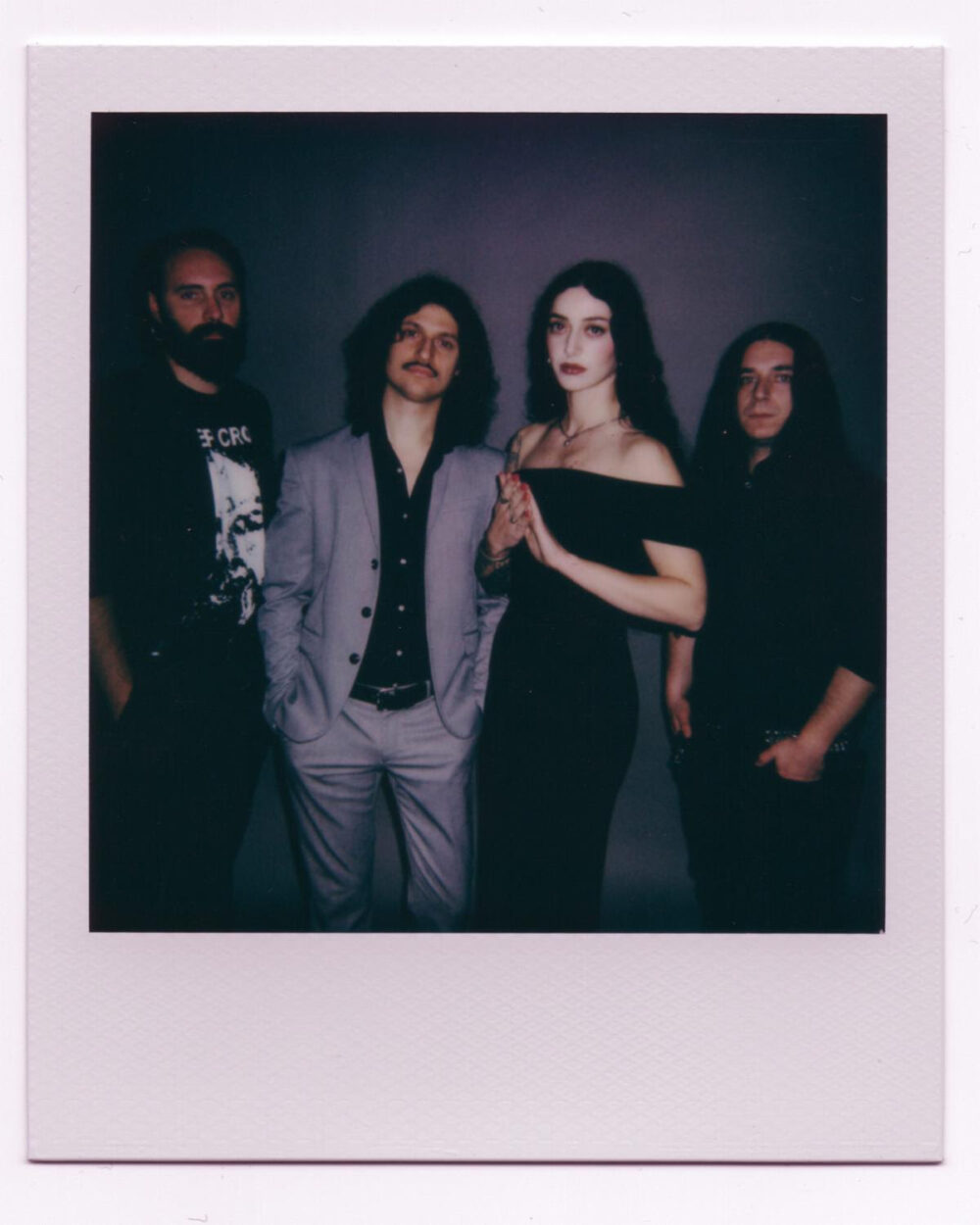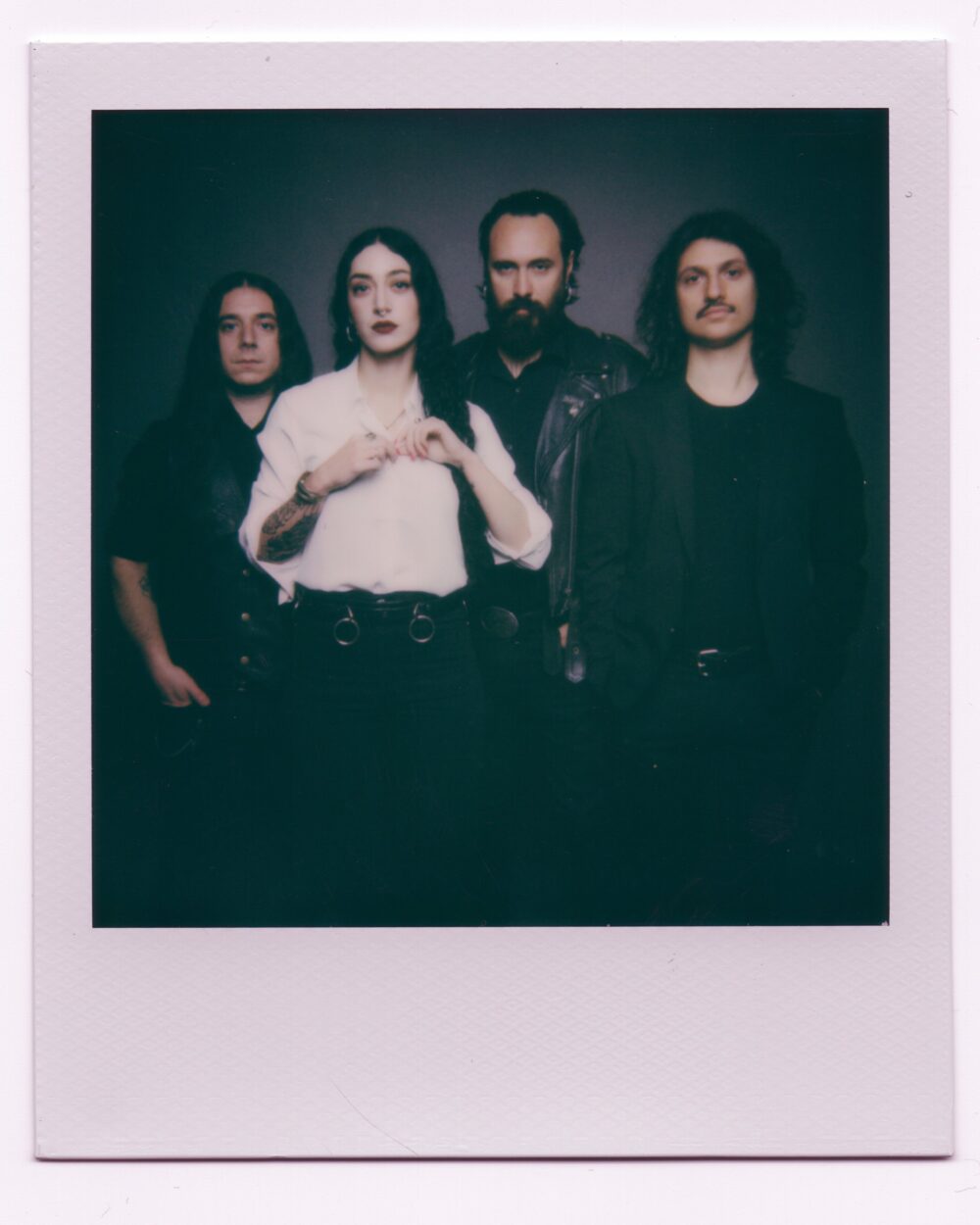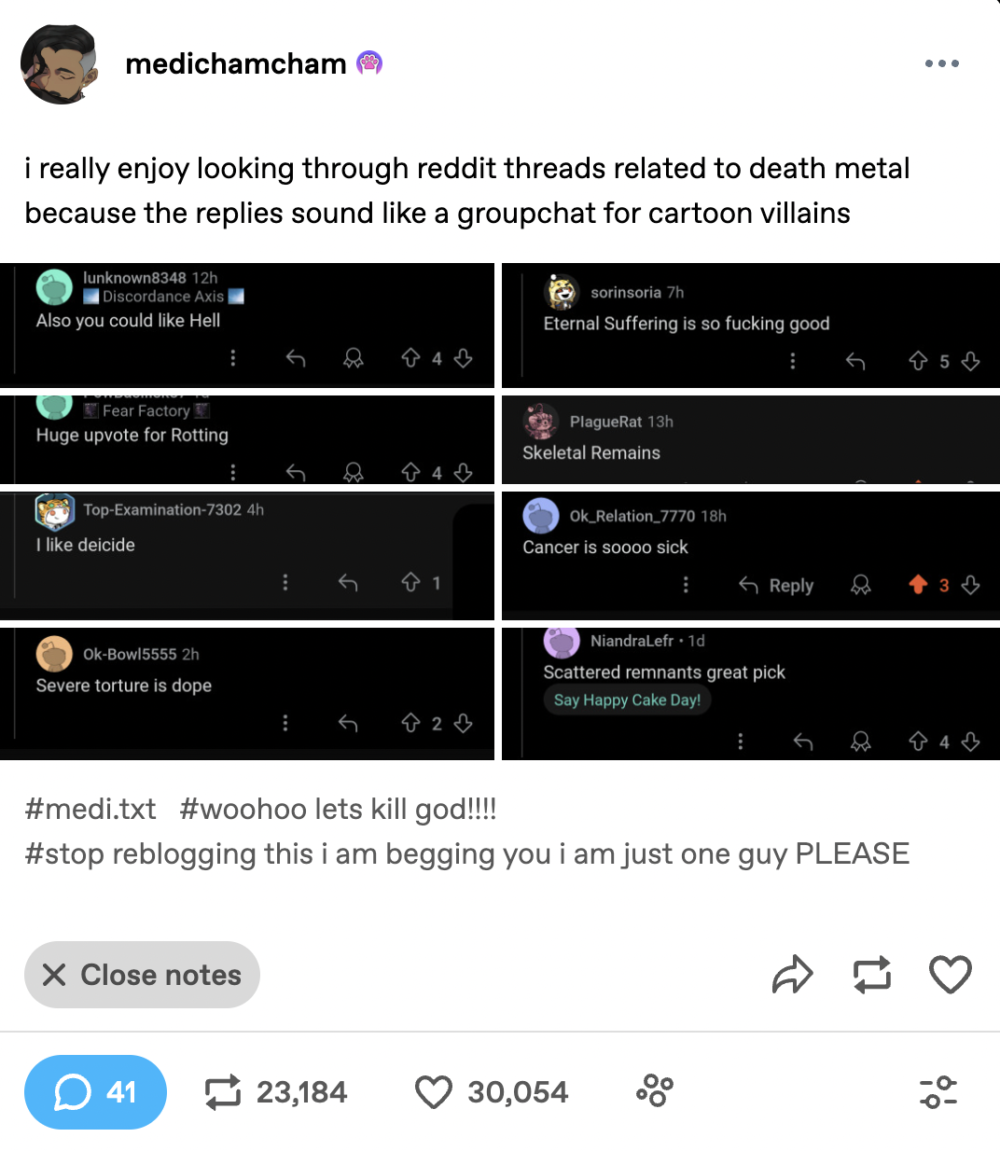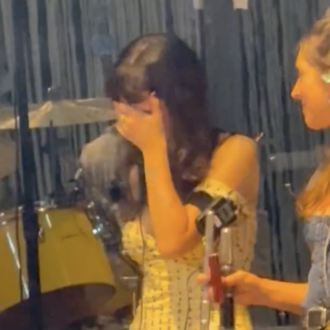The Relentless Reinventions Of Messa

Constant evolution is the beating heart of Messa, the band founded in 2014 by vocalist Sara Bianchin, guitarist Alberto Piccolo, bassist Marco Zanin, and drummer Rocco Toaldo. The four friends from northern Italy initially came together to challenge themselves and to stretch their musical boundaries; none of them had ever played doom metal before starting the band. Bianchin came from a punk background, Piccolo was a blues guitarist, Zanin played mostly hard rock, and Toaldo was in multiple established black metal bands. Perhaps inevitably, Messa very quickly became a band that couldn’t be contained by narrow ideas of genre.
“Since the beginning, we always tried to see where we could go when it comes to destroying clichés, somehow,” Bianchin says. “We never played traditional doom metal. We’ve always been looking a bit outside of the cage.”
2016’s drony Belfry established the bars of that cage – it remains the Messa album most beholden to doom’s textures and tropes – but it also revealed a band eager to breach containment. The album’s 10-minute centerpiece, “Blood,” hinges on a discursive, dissonant clarinet solo, beguilingly alien against its plodding proto-doom surroundings. That song opened the door for the smoky Feast For Water, the band’s jazzy miasma of Rhodes piano and saxophone, which in turn led to the sun-dappled oud and duduk excursions of their epic prog-doom album, Close. And one of that album’s highlights suggested the road that Messa would ultimately take for The Spin, their fourth and finest LP.
“The last song we wrote for Close was ‘Dark Horse.’ That song already fits with some ’80s vibes, and in a way, we developed from that,” Piccolo explains. “Even if it wasn’t clear from the beginning, we found out the direction after [writing] a couple songs.”
The Spin is the first Messa album to explicitly draw inspiration from the music of the ’80s. That makes some intuitive sense: The band’s Sabbathian doom backbone and prog-rock adventurousness come from the ’70s, their forays into electric jazz reference the ’60s, and Piccolo’s blues-influenced playing dates to long before that. When the idea to pull from the ’80s started to emerge, it became clear that each member had their own definition of that era’s music.
“I think Messa is the common ground between the four of us, so it’s always trying to find something the four of us like, which sometimes is not easy,” Piccolo says, coming clean as an apologist for Journey, the Police, and the 1988 Jimmy Page solo album Outrider. Bianchin brought up her love of the first Iron Maiden record, and everybody agreed on the English post-punk acts Killing Joke and the Sound. You can hear bits and pieces of all that stuff in The Spin, but this being Messa, the album was never going to be a mere genre experiment or a slog of borrowed nostalgia. Instead, the ’80s became a philosophical framework for The Spin, an opportunity to reimagine the way they approach their instruments.
“We didn’t want to do an exercise, ‘Do something like the ’80s,'” Piccolo insists. “It has this vibe to it, but it’s still our stuff, for sure, for at least three reasons: The tuning is still the same as the other albums, which keeps the sound dark. The song structures are still quite similar to the old ones. And we are still us playing. It’s difficult to not be yourself if you’re putting yourself into the music.”
Messa indeed sound like Messa and Messa alone on The Spin, but they seem to be reinvigorated by their new prime directive. Piccolo’s guitars are frequently pushed through deathrock-style flangers and chorus pedals, while Toaldo’s drums are produced with booming, Phil Collins-style gated reverb. (Toaldo doesn’t like Phil Collins, but Piccolo does.) A fortune’s worth of vintage synthesizers, played by both Zanin and Piccolo, evoke both Goblin and Depeche Mode. At 41 minutes, The Spin is also the shortest, most direct Messa album. For the first time in band history, they cut a couple of tracks that they felt weren’t up to the standards of the rest of the material. We’re left with seven songs, each one in deep conversation with the others, several only after being painstakingly deconstructed and reconstructed until all four musicians were satisfied.
“We fought a lot regarding the composition of the songs, to achieve something that was sounding as we wanted it to sound. It wasn’t an easy job. Sometimes, we clashed a lot,” Zanin says. “Three of the songs had been already recorded, and as soon as we started to build up other new songs, we started rearranging them. They were good songs, but they weren’t fitting with the others, so we started rearranging them. At the end, we are happy about [the result]. But if we didn’t go through these fights, the result would be — not boring, but basic.”

One of the songs that underwent a significant transformation was “Immolation,” a smoldering showstopper at the album’s midpoint that began life as a Rhodes-driven ballad inspired by Swedish retro-rockers Graveyard. That version didn’t work for The Spin, though, and the band kneaded the raw clay until the song became the epic, ever-crescendoing power ballad that appears on the record. It sounds a little like “November Rain,” if Axl Rose could sing like Adele.
“I loved the song [in its] first version. It’s even more into my taste and personality, so it was a bit of a challenge to take it apart again and make something that fit with the context,” Piccolo says. “I think the real work as an arranger is to be more like an artisan, not like an artist. If you’re doing a chair, you’re just doing a chair, and you don’t need to be tied to your idea of a chair. If the chair needs three legs, you have to do it with three legs, even if you like chairs with four legs.”
For Toaldo, embracing The Spin’s ’80s sounds meant fundamentally changing the way he plays. Gated reverb involves the use of a noise gate, an effect that cuts off the reverb tail and leaves a denuded, snapping drum hit. That means the subtle accents that Toaldo typically likes to pepper into his playing would have been inaudible at best, or muddy at worst.
“I needed to record the pre-production to understand properly what it means on the drum kit,” Toaldo says. “I was not so fast in processing all the differences. I needed to take off some ghost notes, and try not to put fast patterns on the kit, because otherwise, the gated reverb on the snare doesn’t work properly.”
Toaldo speaks for the whole band when he says the adjustments they were forced to make made them better players: “You grow up as a musician, in a way, because you try something different,” he says. “You always have to be hungry to know different things than what you are used to doing.”
Everyone in the band leveled up, but it’s understandable if the first thing you clock on The Spin is Bianchin’s voice. On Belfry, she sounded promising but still very green. (“It was my first experience as a singer,” she says. “I never did it before, so I really wanted to be under the cover of the volume, and very low in the mix.”) Feast For Water and Close were both quantum leaps forward for her confidence and control, but the songs weren’t set up to serve her strengths as single-mindedly as they are on The Spin. As she whispers, croons, and belts her way across the stage her bandmates have set for her, Bianchin sounds utterly limitless. It’s on this album that she claims her mantle as one of the truly great metal singers — not in recent memory, but of all time.
“The vocals [being] very high in the mix was done for many reasons. It was in a complete and total ’80s fashion, because if you listen to albums of that era, there’s a super spotlight on the vocals,” Bianchin says. “But also, I think I’m less frightened by my vocals than I used to be. It took 10 years, but now I’m more — not at peace, but I have a bigger understanding of my vocals, and what it means to have vocals there. I know my instrument a bit better, and I think that translated on the mix.”
The primacy of vocals on The Spin also means there’s a greater focus on lyrics. For the first time on a Messa album, they’re all perfectly legible at a first pass. Bianchin is up to the task, providing a series of concrete yet deliciously elusive images to reflect the past three years in the life of the band. She’d been reading Cormac McCarthy in English for the first time when she wrote these songs, and you can tell. “Can you smell a dead magnolia as the moon hangs upside down?” Bianchin asks on the Blood Meridian nod “Void Meridian.” I don’t know, man, can you?
The Spin isn’t literally about The Road, but it is largely about going out on the road, a frequently McCarthyesque experience that Messa undertook more than ever after the release of Close. The band survived a head-on van crash in France in 2022, and once they recovered from their injuries, they immediately went back on tour. “The gas station becomes your house,” Zanin sighs. Borrowed time and borrowed world and borrowed eyes with which to sorrow it.
“That’s why there’s a fucking ouroboros with a tire that’s surrounding him [on the album cover],” Zanin says. “You’re always far from your loved ones. You’re constantly facing other kinds of people and other experiences and places, and these things really shape you. We smashed the van, and in that moment, it changed something among us. We were aware that we were like a family. When we realized we were doing a new album, we were like, ‘That’s what we’ve been through,’ so it’s an obvious thing that you’d put it in the lyrics and the visuals and the videos and the sounds.”
“I don’t want to sound too romantic, but after the accident, we turned around, and it was just us,” Bianchin says. “On a personal level, these three guys helped me understand things about myself that I was not aware of. There’s a lot of trust between us. Messa has become one of the centers of our lives, if not the center, because we do share a strong vision, and we do care a lot about this project. One thing we learned, and we are still learning, is to value the virtues of each one of us and nurture them.”
TEN NAILS THROUGH THE NECK
Heaven's Gate – "The Causeway Cannibal"
Location: Tampa, Florida
Subgenre: hardcore punk/crossover
You might remember this story from 2012: A man named Rudy Eugene was shot to death by police after attacking and eating the face of a homeless man named Ronald Poppo on the MacArthur Causeway in Miami. Dubbed “the Causeway Cannibal,” Eugene was allegedly under the influence of the street drug “bath salts” at the time of the assault, and you couldn’t escape the bath salts media panic for a few weeks thereafter. People also had jokes at the time about how the attack sounded like a Cannibal Corpse song. They were close — it was actually a Heaven’s Gate song, 10 years before the existence of the band. Cannibal Corpse drummer Paul Mazurkiewicz started Heaven’s Gate in 2022 alongside Warthog guitarist Mike Goo, Municipal Waste vocalist Tony Foresta, and Reversal Of Man bassist Jeff Howe, and the band’s sound reflects the varied backgrounds of its membership. Unlike Cannibal Corpse, whose cartoonishly violent lyrics live in the realm of fantasy, Heaven’s Gate mostly sing about the heinous real-life shit that can happen when the Florida heat melts your brain. “The Causeway Cannibal” is a worthy subject, in other words, and the song about him is a nasty, two-minute hardcore punk workout, blanketed by artillery fire from Mazurkiewicz’s punishing death metal drums. [From Tales From A Blistering Paradise, out now via To Live A Lie Records.]
Slough Feg – "Ice Shelf Stomp"
Location: San Francisco, California
Subgenre: traditional heavy metal
A certain substratum of metal nerd harbors strong opinions about the best album by (The Lord Weird) Slough Feg. I’m a Hardworlder guy – “Tiger! Tiger!” has the best twin leads this side of Iron Maiden – but the most popular pick might be Traveller, the Bay Area band’s 2003 concept album based on the 1977 role-playing game of the same name. That the band would revisit not just the lore but the sound of that album for a series of Traveller Supplement EPs got us dweebs duly excited, and the first entry mostly delivers on the promise. The Ephemeral Glades does a more than passing impression of the band Slough Feg was 22 years ago. It’s chock full of the old-school, Thin Lizzy-obsessed, slightly esoteric trad metal of their beloved early work, and mainman Mike Scalzi does sound rejuvenated by the chance to revisit a past creative high-water mark. “Ice Shelf Stomp” gets the nod here for the autological accuracy of its title. Wear snow boots. [From Traveller Supplement 1 – The Ephemeral Glades, out now via Cruz del Sur.]
Trick Or Treat – "Ghosted"
Location: Modena, Italy
Subgenre: power metal
This is so stupid, dude. But it’s my kind of stupid. Trick Or Treat take a lot of inspiration from second-wave German power metal bands like Edguy and Brainstorm, bands who understood how to wield the goofy humor that was baked into the genre’s formula from the moment Helloween picked up their instruments. “Ghosted” is about being ghosted, but it’s also about being a ghost, as the album cover depicting five white-sheeted phantoms huddled around a glowing iPhone helpfully illustrates. Vocalist Alessandro Conti (also of the excellent symphonic power metal band Twilight Force) doesn’t lean too hard into the silliness of that premise, but he’s clearly having a lot of fun with it. Über-melodic, Euro-style power metal is the final frontier for a lot of American metalheads. If you haven’t sailed this particular sea of cheese before, Trick Or Treat probably aren’t going to change your mind. If you’ve already acquired the taste, Ghosted is worth a nibble. [From Ghosted, out now via Scarlet Records.]
Zeicrydeus – "Sous L'Ombre Éternelle Des Vestiges D'Heghemnon"
Location: Longueuil, Canada
Subgenre: black/heavy metal
Phil Tougas is one of the busiest (and most talented) people in underground metal. The multi-instrumentalist’s résumé spans hyper-technical death metallers First Fragment, gothic black/doom aesthetes Worm, funeral doom crew Atramentus, and a couple dozen more bands besides. His latest venture is Zeicrydeus, a one-man project inspired predominantly by the Hellenic black metal scene of the early ’90s. Like the early classics by Rotting Christ, Varathron, and Thou Art Lord – whose 1994 track “The Era Of Satan Rising” gets a wicked cover version here – La Grande Heresie is essentially a black metal album written with a traditional heavy metal sensibility. The Hellenic bands sounded bright and triumphant as well as evil, and that’s what Zeicrydeus achieve on songs like the mostly instrumental “Sous L’Ombre Éternelle Des Vestiges D’Heghemnon.” Oh, and everywhere on the album that there would normally be a guitar solo, Tougas shreds a bass solo instead. Sorry, buried the lede there. [From La Grande Heresie, out now via the artist.]
Phantom – "Thunderbeast"
Location: Guadalajara, Mexico
Subgenre: speed metal
The German melodic death metal band Night In Gales had a great album in 1998 called Thunderbeast, but I don’t think Phantom are paying homage to it on this standout track from Tyrants Of Wrath. The Guadalajara band’s frame of reference doesn’t seem to extend past about 1987. Their sound is suspended in the moment before extreme metal sorted itself into subgenres. We might understand it as speed metal today, but Tyrants Of Wrath is as influenced by early Exciter and Destructor as it is Slayer, Bathory, Venom, Mercyful Fate, and Tormentor. There’s a sense of relentless forward momentum to “Thunderbeast” that feels downright electric. Whatever a thunderbeast is, Phantom have made it sound like it’s coming to kill you. [From Tyrants Of Wrath, out now via High Roller Records.]
Forged Relics – "Catacombs For The Broken Stars (Eternal Desert)"
Location: Postojna, Slovenia
Subgenre: funeral doom metal
My notes for this one just say, “Bell Witch meets Kali Malone??” I stand by it! The Slovenian band Forged Relics plays funeral doom without stringed instruments — just pipe organ, drums, and voice. That configuration helps to draw out the liturgical qualities already inherent in the genre; if not for the death growls, this music could almost be pouring out of a Russian Orthodox cathedral. It’s also a hand-in-glove fit for funeral doom’s molasses-slow tempos. You can’t fly up and down the fretboard of an organ. The chord changes on the 14-minute “Catacombs For The Broken Stars” are forcibly methodical, almost painfully extracted. The same synthesis of the transcendentally spiritual and the excruciatingly physical that I can hear on Malone’s The Sacrificial Code is present all over Portal. [From Portal, out 4/30 via Rope or Guillotine.]
Black Sword Thunder Attack – "Evil Sorcery"
Location: Kalabaka, Greece
Subgenre: epic heavy metal
Take a moment to soak in that band name. Black Sword Thunder Attack. Black Sword Thunder Attack! The Warlord-worshiping Greeks certainly have their branding down. (Marketing is another story. Their music is not currently available outside of Greece on physical formats, and it’s not on any streaming services.) The band’s self-titled album is a debut two decades in the making. Their demos from 2002, 2011, and 2015 generated some cultish online buzz, and their 2020 EP March Of The Damned fell out of print almost immediately. This marks the first time it’s been possible to sit down with a substantial amount of Black Sword Thunder Attack music. The album is old-school to a fault, with a lo-fi production style not far off from the demos. The songs are mighty, though. Vocalist Mareike sounds like a warrior princess, leading the band down from the Acropolis and into glorious battle. “Evil Sorcery” is one of a handful of cuts on the record that marries its marching drums and rousing riffage with twinkling synth, an effect that only buffs this ultra-cult band’s sheen of mystique. [From Black Sword Thunder Attack, out now via No Remorse Records.]
Belnejoum – "Tower Of Silence"
Location: international
Subgenre: symphonic black metal
Symphonic black metal typically means one of a couple of things. Either a band will use chintzy keyboards in an effort at ripping off the first Emperor album, or they’ll employ an orchestra, real or synthesized, to make black metal inspired by the Western classical canon. It’s rare to hear something like Belnejoum’s Dark Tales Of Zarathustra, which confidently brings Middle Eastern instruments and modes into a convincingly ’90s take on black metal. The Egyptian ney player Hany El-Badry is the clear star of “Tower Of Silence,” and one of the stars of the record. It turns out traditional Arabic flute is a magnificent foil for machine-gun drums, mangled guitars, and wild-eyed vocal incantations. Led by the pseudonymous and permanently costumed Qaswad, Belnejoum is a band to keep on your radar. [From Dark Tales Of Zarathustra, out now via Antiq Records.]
Ancient Death – "Breathe – Transcend (Into The Glowing Streams Of Forever)"
Location: Walpole, Massachusetts
Subgenre: progressive death metal
Speaking of Bands to Watch, I’m so mad that I was too late to write one on Ancient Death before their debut album, Ego Dissolution, came out. It’s the best progressive death metal album I’ve heard since Tomb Mold’s The Enduring Spirit. Guitarist and vocalist Jerry Witunsky also plays in Atheist, and you can hear that band in some of the odd, jazzy rhythms and sunlit melodies they deploy. There’s also a lot of late-period Death in here. Yet it still feels like Ancient Death are rapidly figuring out their own thing, buoyed by the open-ended three-way exchange between Witunsky, co-guitarist Ray Brouwer, and bassist/clean vocalist Jasmine Alexander. (She’s the anchor of the Cynic-coded “Breathe – Transcend (Into the Glowing Streams of Forever).”) In a landscape where most new death metal – hell, most new music – sounds perfunctory and quantized, what Ancient Death is doing on Ego Dissolution feels refreshingly organic. [From Ego Dissolution, out now via Profound Lore Records.]
Messa – "Immolation"
Location: Bassano del Grappa, Italy
Subgenre: doom metal/rock
Take your pick here, honestly. The Spin is my favorite album of 2025 thus far, and all seven of its songs are fucking perfect. Right now, I’m most impressed by “Immolation,” because we don’t get big-swing ballads like this in metal very often these days. What begins as a quiet showcase for piano and voice builds to an eruption as well-earned as any I’ve heard this year. Messa have become one of the best bands in the world before our eyes while remaining under the mainstream radar. It’s not too late to jump on the bandwagon. [From The Spin, out now via Metal Blade Records.]
JOURNEY TO THE WORLD BEYOND




